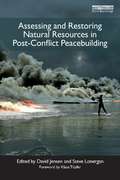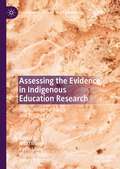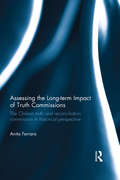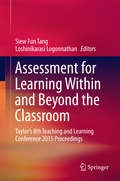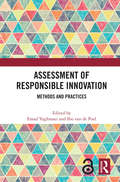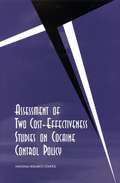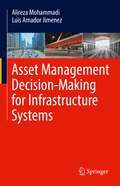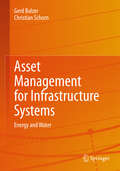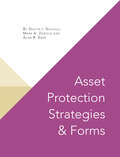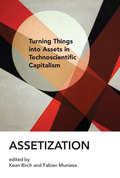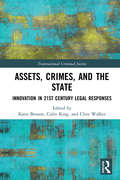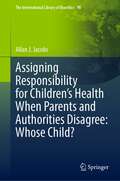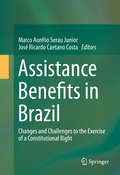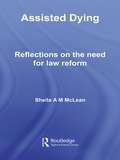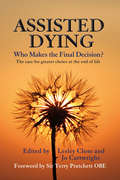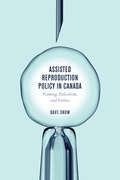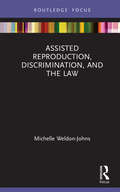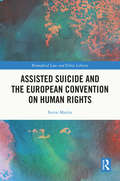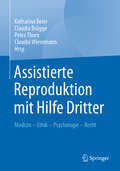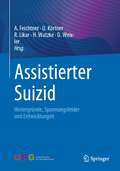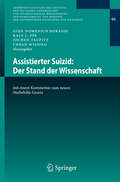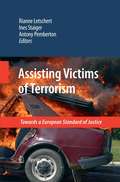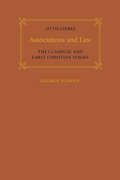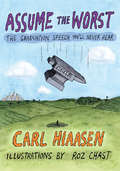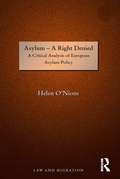- Table View
- List View
Assessing and Restoring Natural Resources In Post-Conflict Peacebuilding: Assessing And Restoring Natural Resources In Post-conflict Peacebuilding (Post-Conflict Peacebuilding and Natural Resource Management)
by David Jensen Steve LonerganWhen a country emerges from violent conflict, the management of the environment and natural resources has important implications for short-term peacebuilding and long-term stability, particularly if natural resources were a factor in the conflict, play a major role in the national economy, or broadly support livelihoods. Only recently, however, have the assessment, harnessing, and restoration of the natural resource base become essential components of postconflict peacebuilding. This book, by thirty-five authors, examines the experiences of more than twenty countries and territories in assessing post-conflict environmental damage and natural resource degradation and their implications for human health, livelihoods, and security. The book also illustrates how an understanding of both the risks and opportunities associated with natural resources can help decision makers manage natural resources in ways that create jobs, sustain livelihoods, and contribute to economic recovery and reconciliation, without creating new grievances or significant environmental degradation. Finally, the book offers lessons from the remediation of environmental hot spots, restoration of damaged ecosystems, and reconstruction of the environmental services and infrastructure necessary for a sustainable peace. Assessing and Restoring Natural Resources in Post-Conflict Peacebuilding is part of a global initiative to identify and analyze lessons in post-conflict peacebuilding and natural resource management. The project has generated six books of case studies and analyses, with contributions by practitioners, policy makers, and researchers. Other books address highvalue resources, land, water, livelihoods, and governance.
Assessing the Evidence in Indigenous Education Research: Implications for Policy and Practice (Postcolonial Studies in Education)
by Kevin Lowe Karen Trimmer Roselyn Dixon Nikki MoodieThis book explores the current state of research on Indigenous education Australia. In particular, these chapters focus on exploring deep and enduring questions about the failures of schooling to address the needs of Aboriginal communities. This book provides a systematic analysis of existing research to explain how connection to culture - and the recognition of Indigenous sovereignties and knowledges - are the keys to Aboriginal excellence in schooling.
Assessing the Long-Term Impact of Truth Commissions: The Chilean Truth and Reconciliation Commission in Historical Perspective
by Anita FerraraIn 1990, after the end of the Pinochet regime, the newly-elected democratic government of Chile established a Truth and Reconciliation Commission (TRC) to investigate and report on some of the worst human rights violations committed under the seventeen-year military dictatorship. The Chilean TRC was one of the first truth commissions established in the world. This book examines whether and how the work of the Chilean TRC contributed to the transition to democracy in Chile and to subsequent developments in accountability and transformation in that country. The book takes a long term view on the Chilean TRC asking to what extent and how the truth commission contributed to the development of the transitional justice measures that ensued, and how the relationship with those subsequent developments was established over time.It argues that, contrary to the views and expectations of those who considered that the Chilean TRC was of limited success, that the Chilean TRC has, in fact, over the longer term, played a key role as an enabler of justice and a means by which ethical and institutional transformation has occurred within Chile. With the benefit of this historical perspective, the book concludes that the impact of truth commissions in general needs to be carefully reviewed in light of the Chilean experience. This book will be of great interest and use to students and scholars of conflict resolution, criminal international law, and comparative legal systems in Latin America.
Assessment for Learning Within and Beyond the Classroom: Taylor’s 8th Teaching and Learning Conference 2015 Proceedings
by Siew Fun Tang Loshinikarasi LogonnathanThese conference proceedings focus on "Assessment for Learning: Within and Beyond the Classroom" in recognition of the power of assessment for learning as a way of boosting student performance. They explore the breadth, depth and quality of the best models and practices, strategies, lessons learnt and discuss cases of successful implementation of assessment within the classroom and beyond, including the virtual space. They also provide fertile ground for stimulating and comparing responsive assessment approaches and practices in relatively new areas of assessment such as graduate capability assessment in view of the need for educational institutions to evidence graduate employability.
Assessment of Responsible Innovation: Methods and Practices
by Emad YaghmaeiResponsible Innovation encourages innovators to work together with stakeholders during the research and innovation process, to better align the outcomes of innovation with the values, needs and expectations of society. Assessing the benefits and costs of Responsible Innovation is crucial for furthering the responsible conduct of science, technology and innovation. However, there is until now only limited academic work on Responsible Innovation assessment. This book fills this lacuna. Assessment of Responsible Innovation: Methods and Practices presents tools for measuring, monitoring, and reporting upon the Responsible Innovation process and the social, environmental, scientific, and economic impacts of innovations. These tools help innovators to mitigate risk and to strengthen their strategic planning. This book aligns assessment tools and practices with the UN Sustainable Development Goals (SDGs). The prospects as well as the limitations of various Responsible Innovation assessment approaches and tools are discussed, as well as their applicability in various industry contexts. The book brings together leading scholars in the field to present the most comprehensive review of Responsible Innovation tools. It articulates the importance of assessment and value creation, the different metrics and monitoring systems that can be deployed and the reporting mechanisms, including the importance of effective communication.
Assessment of Two Cost-Effectiveness Studies on Cocaine Control Policy
by Committee on Data Research for Policy on Illegal DrugsThis study is an important first step in the development of a national policy on illegal drugs. It assesses two recent cost-effectiveness studies on cocaine control policy: one by RAND, Controlling Cocaine: Supply Versus Demand Programs, and the other by the Institute of Defense Analyses, An Empirical Examination of Counterdrug Interdiction Program Effectiveness.
Asset Management Decision-Making For Infrastructure Systems
by Alireza Mohammadi Luis Amador JimenezThis textbook provides practical and concrete guidance for the step-by-step implementation of decision-making for infrastructure asset management. Examples are used to illustrate how data from condition assessment are used to develop performance models, to estimate the effectiveness of investments that are prioritized and scheduled to accomplish reliable and convenient infrastructure for the wellbeing of the public and regional economic competitiveness. Book illustrates numerous worked problems to clarify ambiguity in developing a decision-making platform to prioritize assets and distribute budgets effectively and efficiently.Ensures reader understanding of the benefits and challenges of infrastructure asset management; Provides a step-by-step guide for the development of each component of an asset management decision-making system;Includes worked examples to clarify decision-making and budget allocation process.
Asset Management for Infrastructure Systems: Energy and Water
by Gerd Balzer Christian SchornThe book offers a broad overview of asset management processes for different utilities, with a special emphasis on energy and water. It provides readers with important practical considerations concerning the development of new competitive structures and procedures for guaranteeing a sufficient supply of energy and water in a regulated environment, using clearly defined technical and economic cornerstones. On the one hand asset owners expect suitable interests from their investment and business growth; on the other hand regulators focus more on a reliable and cost-effective customer supply. This book shows how to take into consideration these different perspectives in the process of designing new structures and how to guarantee organizational transparency. Based on the major tasks of an asset manager, it describes essential principles and boundary conditions for ensuring the optimal use of resources in a network, such as investment and maintenance strategies, equipment service life, investment and operational costs, etc. Moreover, it points out their impact on the organization of the company, including the necessary IT landscape and computer programs. The book is the English translation of Asset Management für Infrastrukturanlagen - Energie und Wasser1, written by the same authors and published by Springer in 2014.
Asset Protection Strategies & Forms
by Mark A. Ziebold Dustin I. Nichols Alan R. EberThe living trust has become almost mandatory in estate planning, but it is frequently offered without any thought to safeguarding the inheritance. However, children's inheritances in a living trust can be readily protected from creditors if it is made discretionary or includes shifting language. Asset Protection Strategies & Forms is a complete planning toolbox that provides you with a full range of domestic and international structures for safeguarding assets, from simple spendthrift trusts through equity strips to collapsing bridges. Structures are diagrammed and explained, with supporting law, tax considerations, case studies, and pattern clauses, making them easy to follow and explain. In addition to comprehensive explanations of the various asset protection options, this book offers over 90 forms, helping you do everything you need to protect your clients' assets, from basic client intake to avoid common problems, to setting up sophisticated international trusts for the highest protection. The living trust has become almost mandatory in estate planning, but it is frequently offered without any thought to safeguarding the inheritance. However, children's inheritances in a living trust can be readily protected from creditors if it is made discretionary or includes shifting language. Asset Protection Strategies & Forms is a complete planning toolbox that provides you with a full range of domestic and international structures for safeguarding assets, from simple spendthrift trusts through equity strips to collapsing bridges. Structures are diagrammed and explained, with supporting law, tax considerations, case studies, and pattern clauses, making them easy to follow and explain. In addition to comprehensive explanations of the various asset protection options, this book offers over 90 forms, helping you do everything you need to protect your clients' assets, from basic client intake to avoid common problems, to setting up sophisticated international trusts for the highest protection.
Assetization: Turning Things into Assets in Technoscientific Capitalism (Inside Technology)
by Kean Birch Fabian MuniesaHow the asset--anything that can be controlled, traded, and capitalized as a revenue stream--has become the primary basis of technoscientific capitalism.In this book, scholars from a range of disciplines argue that the asset--meaning anything that can be controlled, traded, and capitalized as a revenue stream--has become the primary basis of technoscientific capitalism. An asset can be an object or an experience, a sum of money or a life form, a patent or a bodily function. A process of assetization prevails, imposing investment and return as the key rationale, and overtaking commodification and its speculative logic. Although assets can be bought and sold, the point is to get a durable economic rent from them rather than make a killing on the market.
Assets, Crimes and the State: Innovation in 21st Century Legal Responses (Transnational Criminal Justice)
by Clive Walker Colin King Katie BensonOrganised crime, corruption, and terrorism are considered to pose significant and unrelenting threats to the integrity, security, and stability of contemporary societies. Alongside traditional criminal enforcement responses, strategies focused on following the money trail of such crimes have become increasingly prevalent. These strategies include anti-money laundering measures to prevent ‘dirty money’ from infiltrating the legitimate economy, proceeds of crime powers to target the accumulated assets derived from crime, and counter-terrorist financing measures to prevent ‘clean’ money from being used for terrorist purposes. This collection brings together 17 emerging researchers in the fields of anti-money laundering, proceeds of crime, counter-terrorist financing and corruption to offer critical analyses of contemporary anti-assets strategies and state responses to a range of financial crimes. The chapters focus on innovative anti-financial crime measures and assemblages of governance that have become a feature of late modernity and on the ways in which individual nation states have responded to anti-money laundering and counter-terrorist financing requirements in light of their specific social, political, and economic contexts. This collection draws on perspectives from law, criminology, sociology, politics, and other disciplines. It adopts a much-needed international approach, focusing not only on expected jurisdictions, such as the United States and United Kingdom, but also on analysis from countries such as Qatar, Kuwait, Iran, and Nigeria. The authors stand out for their fresh and original research, which places them at the cutting edge of the subject. This book provides a comprehensive, insightful, and original study of an important and developing field for academics, students, practitioners, and policymakers in multiple jurisdictions.
Assigning Responsibility for Children’s Health When Parents and Authorities Disagree: Whose Child? (The International Library of Bioethics #90)
by Allan J. JacobsThis book provides a multidisciplinary analysis of the potential conflict between a government’s duty to protect children and a parent(s)’ right to raise children in a manner they see fit. Using philosophical, bioethical, and legal analysis, the author engages with key scholars in pediatric decision-making and individual and religious rights theory. Going beyond the parent-child dyad, the author is deeply concerned both with the inteests of the broader society and with the appropriate limits of government interference in the private sphere. The text offers a balance of individual and population interests, maximizing liberty but safeguarding against harm. Bioethics and law professors will therefore be able to use this text for both a foundational overview as well as specific, subject-level analysis. Clinicians such as pediatricians and gynecologists, as well as policy-makers can use this text to achieve balance between these often competing claims. The book is written by a physician with practical and theoretical knowledge of the subject, and deep sympathy for the parental and family perspectives. As such, the book proposes a new way of evaluating parental and state interventions in children's’ healthcare: a refreshing approach and a useful addition to the literature.
Assistance Benefits in Brazil: Changes and Challenges to the Exercise of a Constitutional Right
by Marco Aurélio Serau Junior José Ricardo Caetano CostaThis edited book focuses on the most controversial aspects of assistance benefits as mandated by the Brazilian Constitution of 1988 - and the challenges that have merged since the approval, in 1993, of the Federal Act 8. 742, also known as Organic Law of Social Assistance. This collection of essays allows the reader to understand some important changes in social assistance policies in Brazil in recent years, having the General Theory of Social Security and the Human Rights as references. The tensions between economic principles and affirmative policies for the less advantaged parts of the society are also covered, showing how different interpretations of key concepts - like need, poverty or family - may have an important role on the exercise of fundamental rights.
Assisted Dying: Reflections on the Need for Law Reform (Biomedical Law and Ethics Library)
by Sheila McLeanAssisted Dying explores the law relating to euthanasia and assisted suicide, tracing its development from prohibition through to the laissez faire attitude adopted in a number of countries in the 21st Century. This book provides an in-depth critique of the arguments surrounding legislative control of such practices and particularly looks into the regulatory role of the state. In the classical tradition of libertarianism, the state is generally presumed to have a remit to intervene where an individual’s actions threaten another, rather than harm the individuals themselves. This arguably leaves a question mark over the state’s determined intervention, in the UK and elsewhere, into the private and highly personal choices of individuals to die rather than live. The perceived role of the state in safeguarding the moral values of the community and the need for third party involvement in assisted suicide and euthanasia could be thought to raise these practices to a different level. These considerations may be in direct conflict with the so called right to die espoused by some individuals and groups within the community. However this book will argue that the state’s interests are and should be second to the interests that the people themselves have in choosing their own death. Assisted Dying is winner of the The Minty Prize of the Society of Authors, and winner of the Royal Society of Medicine Book Awards, 2008
Assisted Dying: Who Makes the Final Decision
by Terry Pratchett Jo Cartwright Lesley CloseThe latest developments in the arguments for and against assisted dying, with a foreword by Terry PratchettAssisted dying is perhaps one of the most divisive issues of the modern age, generating endless headlines and moral debates. Published in conjunction with the organization Dignity in Dying, this important book provides a forum for expert commentators in a variety of fields, including religion and medicine, to explore whether the most humane response to the torment and helplessness of certain severely incapacitated individuals is to assist them in their wish to die. This collection is edited by two proponents of greater choice at the end of life, and all the contributors support the need to change the law. Starting from a position that the current legal situation is untenable, detailed case studies shed light on the negative consequences of the current state of the law which forbids assisted dying, and the lack of choices offered to dying people who are suffering intolerably at the moment. The book's case studies punctuate chapters, written by a variety of authors, about different aspects of the subject: these chapters attempt to address the concerns raised by the case studies.
Assisted Reproduction Policy in Canada: Framing, Federalism, and Failure
by Dave SnowThe world has undergone a revolution in assisted reproduction, as processes such as in vitro fertilization, embryonic screening, and surrogacy have become commonplace. Yet when governments attempt to regulate this field, they have not always been successful. Canada is a case in point: six years after the federal government created comprehensive legislation, the Supreme Court of Canada struck it down for violating provincial authority over health. In Assisted Reproduction Policy in Canada, Dave Snow provides the first historical exploration of Canadian assisted reproduction policy, from the 1989 creation of the Royal Commission on New Reproductive Technologies to the present day. Snow argues the federal government’s policy failure can be traced to its contradictory "policy framing," which sent mixed messages about the purposes of the legislation. In light of the federal government’s diminished role, Snow examines how other institutions have made policy in this emerging field. Snow finds provincial governments, medical organizations, and even courts have engaged in considerable policymaking, particularly with respect to surrogacy, parentage, and clinical intervention. The result—a complex field of overlapping and often conflicting policies—paints a fascinating portrait of different political actors and institutions working together. Accessibly written yet comprehensive in scope, Assisted Reproduction Policy in Canada highlights how paying attention to multiple policymakers can improve our knowledge of health care regulation.
Assisted Reproduction, Discrimination, and the Law: Conceiving a New Interpretation of Equality
by Michelle Weldon-JohnsThe numbers of women undergoing Assisted Reproduction Technology (ART) treatments have risen steadily, yet they remain largely outside the scope of equality and employment law protection while undergoing treatment. Assisted Reproduction, Discrimination, and the Law examines this gap in UK law, with reference to EU law as appropriate, and argues that new conceptions of equality are necessary. Drawing from the literature on multidimensional and intersectional discrimination, it is argued that an intersectionality approach offers a more useful analytical framework to extend protection to those engaged in ART treatments. Drawing from Schiek’s intersectional nodes model, the book critically examines two alternative interpretations of existing protected characteristics, namely infertility as a disability, with reference to the social model of disability and the UN Convention on the Rights of Persons with Disabilities 2006, and redefining the boundaries of pregnancy and/or sex discrimination, with reference to attempts to extend associative discrimination to pregnancy. Comparisons are drawn with the US, where infertility has been recognised as a disability under the American’s with Disabilities Act 1990 and as a pregnancy-related condition under the Pregnancy Discrimination Act 1978. A specific right to paid time off work to undergo treatment is also proposed, drawing comparisons with the US Family and Medical Leave Act 1993 and the existing UK work-family rights framework. It is argued that the reinterpretations of equality law and the rights proposed here are not only conceptually possible, but could practically be achieved with minor, but significant, amendments to existing legislation.
Assisted Suicide and the European Convention on Human Rights (Biomedical Law and Ethics Library)
by Stevie MartinLocating assisted suicide within the broader medical end-of-life context and drawing on the empirical data available from the increasing number of permissive jurisdictions, this book provides a novel examination of the human rights implications of the prohibition on assisted suicide in England and Wales and beyond. Assisted suicide is a contentious topic and one which has been the subject of judicial and academic debate internationally. The central objective of the book is to approach the question of the ban’s compatibility with the European Convention on Human Rights afresh; freed from the constraints of the existing case law and its erroneous approach to the legal issues and selective reliance on empirical data. The book also examines the compatibility of the ban on assisted suicide with rights which have either been erroneously disregarded or not considered by either the domestic courts or the European Court of Human Rights. Having regard to human rights jurisprudence more broadly, including in the context of abortion, the research and analysis undertaken here demonstrates that the ban on assisted suicide violates the rights of a significant number of individuals to life, to freedom from torture or inhuman or degrading treatment and to private life. Such analysis does not depend on a strained or contrived approach to the rights at issue. Rather, the conclusions flow naturally from a coherent, logical application of the established principles governing those rights. While the focus of the book is the Suicide Act 1961, the conclusions reached have implications beyond England and Wales, including for the other devolved jurisdictions and international jurisdictions. Beyond courts and legislators, it will be a valuable resource for students of human rights and medical law, as well as medical and legal practitioners and academics working in human rights and end-of-life care.
Assistierte Reproduktion mit Hilfe Dritter: Medizin - Ethik - Psychologie - Recht
by Claudia Wiesemann Petra Thorn Katharina Beier Claudia BrüggeSammelband mit Beiträgen von 28 Expertinnen und Experten aus dem Bereich der assistierten Reproduktion.Immer häufiger werden Verfahren der medizinisch assistierten Reproduktion genutzt, die den Beitrag Dritter einschließen, also Samenspende, Eizellspende, Embryospende oder Leihmutterschaft. Diese Formen der Familienbildung mit Hilfe Dritter werfen ein breites Spektrum an medizinischen, ethischen, rechtlichen und lebensweltlichen Fragen auf, die umfassend und im interdisziplinären Kontext diskutiert werden sollten. In diesem Sammelband mit Beiträgen in deutscher und englischer Sprache diskutieren Expertinnen und Experten aus unterschiedlichen fachlichen und lebensweltlichen Perspektiven Probleme und Lösungsansätze. Empirische Analysen aus der internationalen Forschung und Praxisbeispiele aus Großbritannien, USA, Australien und Neuseeland ergänzen die Darstellung.
Assistierter Suizid: Hintergründe, Spannungsfelder und Entwicklungen
by Rudolf Likar Angelika Feichtner Ulrich Körtner Herbert Watzke Dietmar WeixlerDie Legalisierung der Beihilfe zum Suizid bringt tiefgreifende gesellschaftliche Veränderungen mit sich. Das bisherige Selbstverständnis von Medizin und Pflege wird in Frage gestellt und es wird eine neue Auseinandersetzung mit dem Leid am Lebensende erfordern. Das Buch bietet einen Überblick über die ethischen Aspekte und die internationalen Entwicklungen der Suizidassistenz sowie über die Spannungsfelder, die sich durch die Legalisierung der Beihilfe zum Suizid aus der Sicht von Palliative Care ergeben. Die Entwicklungen in anderen Ländern, in denen Suizidassistenz schon länger legal ist, geben Anlass zur Sorge. Es wird entscheidend sein, wie gut es gelingt, Rahmenbedingungen festzulegen, die gewährleisten, dass der Entschluss für einen assistierten Suizid frei von Druck getroffen wird. Das Buch richtet sich an alle Berufsgruppen, die Patienten am Lebensende behandeln oder betreuen und schwierige Entscheidungen treffen müssen, sowie an ethischen Themen Interessierte.
Assistierter Suizid: mit einem Kommentar zum neuen Sterbehilfe-Gesetz (Veröffentlichungen des Instituts für Deutsches, Europäisches und Internationales Medizinrecht, Gesundheitsrecht und Bioethik der Universitäten Heidelberg und Mannheim #46)
by Jochen Taupitz Ralf J. Jox Gian Domenico Borasio Urban WiesingDas Buch dokumentiert die Beitr#65533;ge des internationalen Symposiums ,,Assistierter Suizid: Der Stand der Wissenschaft" vom 15. Juni 2015 in Berlin. Es bietet einen einmaligen #65533;berblick #65533;ber die aktuellen empirischen Untersuchungen zum Thema, die in der politischen Debatte teilweise schlicht ignoriert wurden und immer noch ignoriert werden. Es enth#65533;lt au#65533;erdem die Transkripte aufschlussreicher Pro-Contra Debatten zwischen Vertretern unterschiedlicher Positionen aus den Fachgebieten Recht, Medizin und Ethik. Am Schluss steht eine ausf#65533;hrliche Kommentierung des neuen Gesetzes ,,zur Strafbarkeit der gesch#65533;ftsm#65533;#65533;igen F#65533;rderung der Selbstt#65533;tung" aus rechtlicher, medizinischer und ethischer Perspektive. Die Autoren und Herausgeber sind international ausgewiesene Experten aus Deutschland und aus anderen Staaten, in denen die T#65533;tung auf Verlangen und/oder der assistierte Suizid gesetzlich geregelt sind (Niederlande, Schweiz, USA).
Assisting Victims of Terrorism: Towards a European Standard of Justice
by Rianne Letschert Antony Pemberton Ines StaigerThe large-scale terrorist attacks on 9/11 resulted in more attention being devoted to victims of terrorist acts. Discussions took place on how their needs could be best accommodated. The Madrid bombings in March 2004 gave further impetus to this process. This development is also part of a recent trend towards general victim of crime policies that branch out into specialized policies devised to meet the needs of particular groups of victims such as victims of trafficking, victims of sexual violence and abuse or victims of traffic accidents. However, although a movement of national and international solidarity relating to addressing the needs of victims of terrorism has developed, political consensus is still fragile. This book provides a thorough analysis of the specific needs of victims of terrorism (using both legal and psycho-social studies), compared to victims of other forms of crime. The study combines different disciplines, enabling to combine the different perspectives leading to synergy in the analysis of the legal and psycho-social needs of victims of terrorism. Furthermore the appropriateness of restorative justice practices in the context of terrorism is included and provides challenging new insights.
Associations and Law: The Classical and Early Christian Stages
by Otto Gierke George HeimanGeorge Heiman has translated the discussion of classical and early Christian laws of association from the major works by Grotto Gierke, Das deutsche Genossenschaftsrecht. This work complements F.W. Maitland's translation of a later part under the title, The Political Theories of the Middle Ages, and E. Barker's translation of the third part, Natural Law and the Theory of Society, 1500-1800. Professor Heiman thus has completed the circle in bringing into English the eminent German jurist's historical analysis of the law. Professor Heiman furthermore has introduced the work with substantial, detailed, and scholarly essays on Gierke's work as a whole. He examines and explains Gierke's concept of the group-person and his organic view of the association, society, and the state, and clearly outlines the conflict between individualist Roman and collectivist Germanic law. This introduction provides the first complete analysis in English of the philosophy of a major representative of the school of historical law and a jurist whose thinking is reflected in the general civil code adopted in Germany at the end of the nineteenth century. The book will interest political and social theorists as well as those concerned with jurisprudence and legal philosophy.
Assume the Worst: The Graduation Speech You'll Never Hear
by Carl Hiaasen Roz ChastThis is Oh, the Places You'll Never Go--the ultimate hilarious, cynical, but absolutely realistic view of a college graduate's future. And what he or she can or can't do about it."This commencement address will never be given, because graduation speakers are supposed to offer encouragement and inspiration. That's not what you need. You need a warning." So begins Carl Hiaasen's attempt to prepare young men and women for their future. And who better to warn them about their precarious paths forward than Carl Hiaasen? The answer, after reading Assume the Worst, is: Nobody. And who better to illustrate--and with those illustrations, expand upon and cement Hiaasen's cynical point of view--than Roz Chast, best-selling author/illustrator and National Book Award winner? The answer again is easy: Nobody. Following the format of Anna Quindlen's commencement address (Being Perfect) and George Saunders's commencement address (Congratulations, by the way), the collaboration of Hiaasen and Chast might look typical from the outside, but inside it is anything but. This book is bound to be a classic, sold year after year come graduation time. Although it's also a good gift for anyone starting a job, getting married, or recently released from prison. Because it is not just funny. It is, in its own Hiaasen way, extremely wise and even hopeful. Well, it might not be full of hope, but there are certainly enough slivers of the stuff in there to more than keep us all going.
Asylum - A Right Denied: A Critical Analysis of European Asylum Policy (Law and Migration)
by Helen O'NionsIn recent decades, asylum has emerged as a highly politicized European issue. The term ’asylum seeker’ has suffered a negative perception and has been associated with notions of illegality and criminality in mainstream media. These misconceptions have been supported by politicians as a distraction from economic and political uncertainties with the result that asylum seekers have been deprived of significant rights. This book examines the effect of recent attempts of harmonization on the identification and protection of refugees. It considers the extent of obligations on the state to admit and protect refugees and examines the 1951 Refugee Convention. The motivations of European legislators and legislation concerning asylum procedures and reception conditions are also analysed. Proposals and initiatives for refugee movements and determinations are examined and assessed. The author makes suggestions for better protection of refugees while responding to the security concerns of States, and questions whether European law and policy is doing enough to uphold the fundamental right to seek and enjoy asylum as set out in the Universal Declaration of Human Rights. This book takes a bold look at a controversial issue and generates discussion for those involved in the fields of human rights, migrational and transnational studies, law and society and international law.
